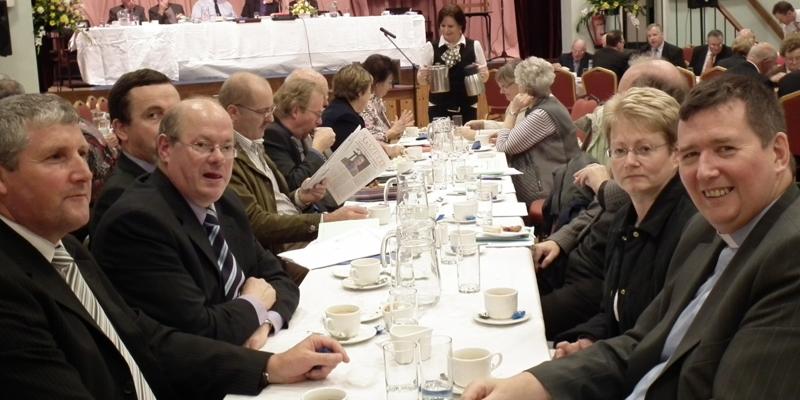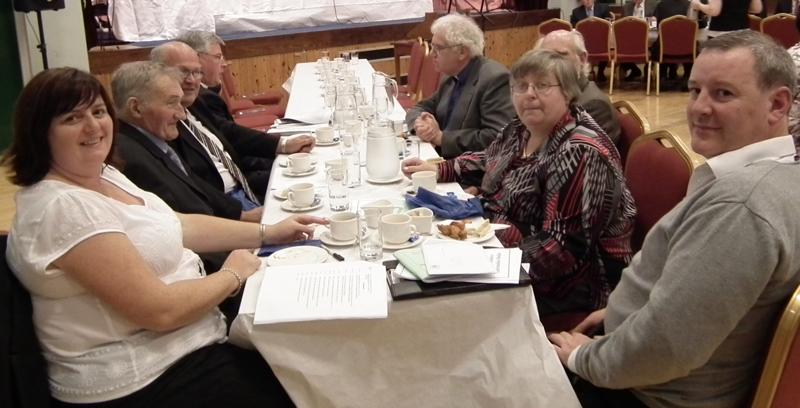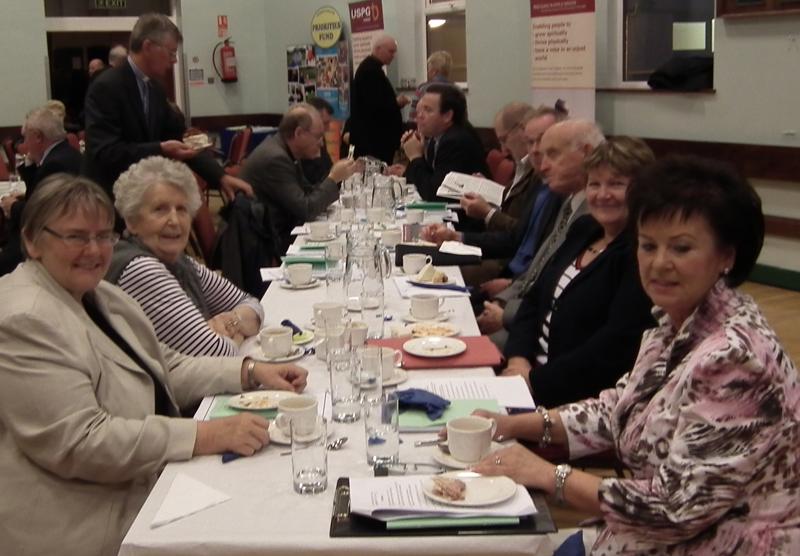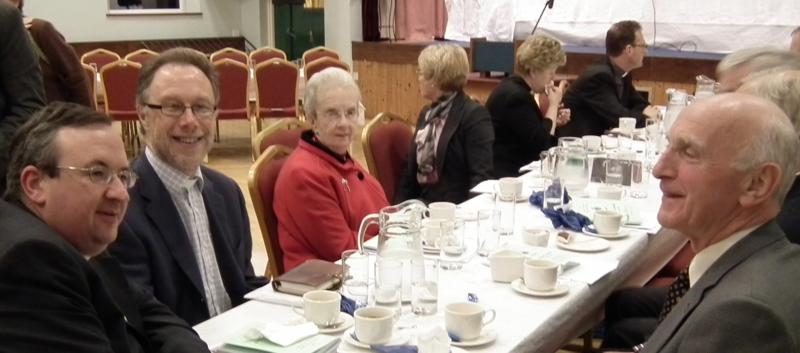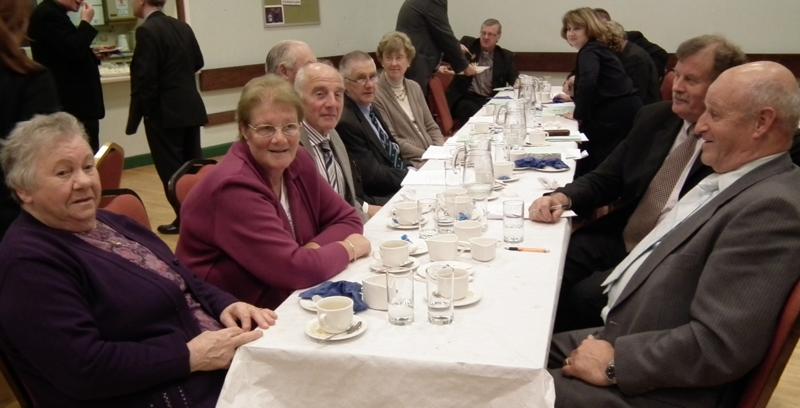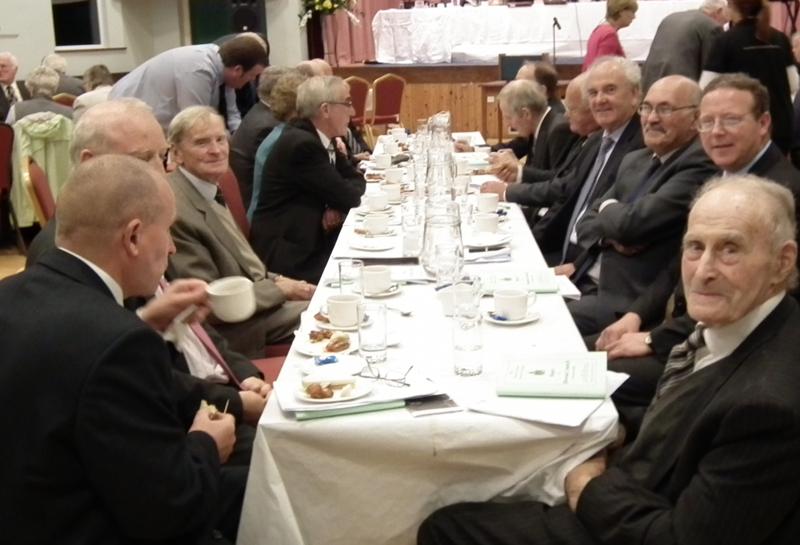News
synod 2010
REPORT OF CLOGHER DIOCESAN SYNOD 2010

Clogher Diocesan Synod took place on Thursday 30th September 2010 in St
Macartin’s Cathedral Hall, Enniskillen. During the Pre-Synod Service
of Holy Communion, at which the bishop was celebrant, Mr Chris Treacy, a
Synod member from Monaghan Parish along with Mr Noel Baxter of the Presbyterian
Church and Mr Gerry Burns MBE of the Roman Catholic Church read the lessons,
and in the spirit of the Covenant the Revd Samuel McGuffin, of the Methodist
Church, assisted with the administration of Communion. The Gospel was read
by the newly appointed Dean of Clogher and Rector of Enniskillen, the Very
Revd Kenneth Hall, and the intercessions were led by the Revd Margaret Pringle.
The Assessor was Sir Anthony Hart, and Synod opened with a reading from
Ephesians read by Mrs Mae Glenn, a Synod member from Magheraculmoney Parish,
and prayers which were led by Archdeacon Cecil Pringle.
In his address to Synod, entitled looking in the mirror, the bishop said “we
have in many worrying ways become conformed rather than transformed, to use
a useful pair of words from St Paul: conformed too much not only to the world
in which we live, but also to the church as we have made it and to the Bible
as we have limited it; transformed too little into the people whom Jesus
wants us to be.” In continuing, the bishop said “too much of
our effort is driven by a quest for conversion and too little by a thirst
for transformation. Both are vital in the dynamic of salvation, but playing
them off against one another does not help us, going forward, as they say.
Throughout world-wide Anglicanism there is emerging, and in fact it is happening
both within and across the fault-lines, a clear recognition that there is
a new urgency for kingdom values and for holiness of life.” The bishop
went on to say “there is a need to recognize that, as people of God,
we are called to live in and out of the church all the time. The world will
not go away and we as followers of Jesus Christ are called not to turn our
backs on it. The influences which come to bear on us, young and old alike,
are such that wise discernment is needed at all times, and yet real events
happening in our time dictate the pace and the shape of events themselves – as
they always have done and always will do. No longer will any one solution
suit any given range of people.”
Also during his address the bishop made reference to The Saville Report,
and went on to speak about examples from our own experience and insight,
which “leave us with explanations of the truth which maybe satisfy
some but certainly do not satisfy everyone.” Speaking about the Peace
Process, the bishop posed the questions “Are we contented by the
level of The Peace? Are we once again settling for the recognition that
it suits us a great deal better because it does not really affect us? And
a further question: Does sectarianism itself, somehow, rather suit us?” He
went on to say “Try and tell that to residents of Aughnacloy! Try
and tell that to three small children in Lurgan! Try and tell that to certain
serving and retired members of PSNI! Try and tell it to the thousands of
people who remain at the mercy of ever-younger gangland godfathers! The
picture may be sporadic but the cumulative evidence is cause for serious
alarm. Sectarianism still sells at a premium right across Ireland. But,
you see, this time we have no excuse. Many of us have lived through earlier
Troubles. Many of us lived through the searing consequences of suffering,
bullying, fragmentation and victimhood. Many of us carry a bitterness which
does not enhance our lives when we stand back and look at ourselves in
that mirror.”
Speaking in relation to the Diocese and Parishes, the bishop said “from
time to time, there is discussion and indeed tension about whether the parish
or the diocese is at the heart of our understanding of who we are. As Anglicans
we don’t have the luxury of an either/or. We are both and we need both.” He
continued “the bishop was, and remains, both an administrative and
liturgical focus living pastorally and teaching theologically - and that
has nothing to do with the personality of the individual, whether you like
the bishop or not. Again, this tangible link is maintained to this day as
a living thing, particularly in the Act of Institution of an incumbent and
in the fact that a bishop depends on the pro-active good will of priests
and deacons in the setting forth of the work of God on earth in parishes.”
In relation to a number of matters specific to the diocese, the bishop spoke
about three Groups of people from the parishes of Clogher Diocese and beyond
who have, in a period of eighteen months, gone on pilgrimage to the Holy
Land. He went on to say “in a spirit of generosity and appreciation
both of the plight and of the witness of the Christian people of the Holy
Land, a Committee was established for The Holy Land Medical Relief Fund in
Clogher Diocese, which within a year, has raised sufficient funds for us
to provide and supply two open system incubators and two neonatal monitors
to St Luke’s Hospital, Nablus and a stress test system, an ECG recorder,
a defibrillator, an emergency trolley and a vital signs monitor to a new
Cardiac Clinic in Ramallah, an outreach of St Luke’s, as the first
phase of giving.”
The bishop also spoke about his visit to the Diocese of Kaduna in the Province
of Nigeria where he was welcomed with great warmth and affection. Clogher
Diocese had already helped with irrigation and the development of farming
and now there was a brand-new building which can accommodate sixty people,
with a courtyard and large room for meeting and worship, which he dedicated
on Jacaranda Farm whilst in Nigeria. The bishop said “my time there
was set in the heart of mission: a three-day workshop involving Mothers’ Union,
medical personnel and clergy on HIV/AIDS; time in villages where doctors
and evangelists work hand in hand; frequent preaching and a large three-day
Advent Rally for the diocese of the Kaduna Province attended by more than
five thousand people.”
Following the bishop’s address, the four outgoing honorary secretaries,
the Revd Maurice Armstrong, the Revd Bryan Kerr, Mr Norman Hilliard and Mr
John Irvine, were re-elected. Greetings were brought to Synod by the Revd
David Cupples on behalf of the Presbyterian Church, Revd Samuel McGuffin
on behalf of the Methodist Church and the Revd Peter O’Reilly on behalf
of the Roman Catholic Church.
Outgoing member of the RCB, Mr William Allen, was returned for another term.
During the Synod interval all present enjoyed a buffet meal.
The Bishop presented Archdeacon Ruddell Prizes which are annually awarded
by the Clogher Diocesan Board of Religious Education. In 1st place was St
Salvator's Sunday School, Glaslough; 2nd place went to Miss Jemma Foster,
Aghavea Parish; and 3rd place went to Kilskeery Sunday School.
The 139th Report of the Diocesan Council was proposed by Mr Sam Morrow MBE,
seconded by the Revd Bryan Kerr and adopted. Two significant motions were
approved unanimously by Synod, the first of these was a new Diocesan Financial
Scheme to come into effect in 2011 which was proposed by the Revd Robert
Kingston and seconded by Mr John Irvine. The new scheme will replace a scheme
which was originally produced in 1954 with subsequent revisions, one which
stood the test of time, but over the years had become very complex. A small
working group was established to devise the new scheme, and a number of principles
were outlined, which included maintaining the principle of pooling, avoiding
increased assessment on the majority of incumbencies, breaking the link with
incumbency population as a means to calculating a per capita assessment,
reducing the financial burden on larger incumbencies, providing financial
support for the financially weaker parishes, encouraging all parishes to
operate fairly within the scheme, and radically simplifying the scheme.
The second motion which was approved by Synod were the new Diocesan Standing
Orders and Rules which were proposed by Mr Henry Robinson and seconded by
the Revd Robert Kingston. The revision was undertaken in order to ensure
the standing orders and rules were in compliance with any changes made to
the Constitution of the Church of Ireland since the rules were first devised,
and to update out of date phraseology.
The Revd Henry Blair spoke to the Diocesan Youth Committee (NI) Report,
and Mr George Montgomery spoke to the Diocesan Youth Committee (County Monaghan)
Report. The Report of the Clogher Diocesan Board of Religious Education was
proposed by the Revd Margaret Pringle and seconded by the Revd David Skuce,
and the Report of the Clogher Diocesan Board of Mission was proposed by the
Revd Charles Eames and seconded by the Revd Bryan Kerr.
The Report of the Clogher Diocesan Board of Social Responsibility was proposed
by Mr Neville Armstrong and seconded by the Revd Charles Eames, and included
the adoption of a motion to change the name of the board to the Diocesan
Board of Social Theology in Action, in order to bring the name into line
with the new central church board.
The Revd Maurice Armstrong spoke to the Diocesan Ministry of Healing Report,
and the Report of the Clogher Diocesan Glebes Committee was proposed by the
Revd Helene Steed and seconded by Mr John Keating.
